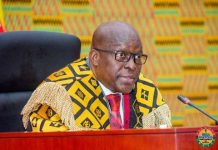On May 6, 2025, the Supreme Court of Ghana heard a constitutional challenge concerning the suspension of Chief Justice Gertrude Torkornoo.
The case arises from President John Mahama’s decision on April 22, 2025, to suspend the Chief Justice following three separate petitions alleging misconduct.
The President stated that, after consulting the Council of State, a prima facie case was established and, in accordance with Article 146(6) of the 1992 Constitution, a five-member committee had been constituted to investigate the matter. The composition of the committee includes two Supreme Court justices and three non-legal, non-parliamentary, and non-Council of State members.
Legal Framework and Procedural Controversy
This matter is governed by Article 146 of Ghana’s Constitution, which outlines the procedure for removing a Chief Justice or a superior court judge. Article 146(6) requires that when the President receives a petition for the removal of the Chief Justice, he shall consult the Council of State and, if a prima facie case is found, refer the matter to a committee for investigation.
However, the Constitution is silent on whether the subject of the petition (in this case, the Chief Justice) must be invited to comment or respond before the President determines whether a prima facie case exists. This silence raises a constitutional lacuna.
Despite this gap, the Supreme Court case of Agyei-Twum v. Attorney-General & Akwetey (2005–2006) SCGLR 732 is instructive. In that case, the Court held that the right to be heard is a fundamental requirement of due process—even at the preliminary stage of determining whether a prima facie case exists. The failure to allow the judge involved to comment on the petition before action was taken was deemed unconstitutional.
In the current matter, an inference can be drawn that the Council of State did refer the petitions to Chief Justice Torkornoo for her comments before forming their view. This is based on reports suggesting that she was asked to provide a response after the President had referred the matter to the Council. While this may seem like a procedural safeguard, it is unclear whether it satisfies the requirements of natural justice as defined by case law.
Does the Council of State’s Referral to the CJ Cure the Constitutional Defect?
This is the heart of the pending legal question.
• The Constitution does not require the President to consult the Chief Justice before determining whether a prima facie case exists—nor does it prohibit it.
• The Council of State, while advisory, has no investigative powers and is not the appointing or suspending body. Their act of requesting the CJ’s comments may show an attempt to protect due process but arguably falls short of the standard in Agyei-Twum, where procedural fairness was deemed essential even at the preliminary stage.
• If the President did not himself seek the CJ’s input before concluding a prima facie case existed, the constitutional principle of fairness may have still been breached, regardless of the Council’s actions.
Therefore, the fact that the Council of State invited the CJ to comment does not, in itself, cure the process if the President acted unilaterally before hearing from her.
Bench Composition and Next Steps
The Supreme Court panel is composed of five justices. The original hearing was indefinitely adjourned due to the absence of Justice Samuel Asiedu but was rescheduled for May 6, 2025.
The Court needed to consider:
• Whether Article 146 implicitly requires a response from the judge before the President determines a prima facie case;
• Whether the actions of the Council of State satisfy that procedural requirement; and
• Whether the process followed respects natural justice and aligns with precedent in Agyei-Twum.
Opinion
This case exposes a critical lacuna in Ghana’s Constitution: the absence of express provisions requiring that a judge be allowed to respond to allegations before a prima facie case is determined. While the Council of State’s referral to the Chief Justice may reflect procedural awareness, it arguably does not substitute the President’s constitutional duty to act fairly and independently.
If the Court upholds the suspension without insisting on a clear right of response at the prima facie stage, it may set a dangerous precedent—enabling future presidents to act against sitting judges without affording them the right to be heard.
On the other hand, if the Court finds that procedural fairness was breached, it may rule that the suspension was unconstitutional and reinstate the Chief Justice, strengthening the independence of the judiciary.












